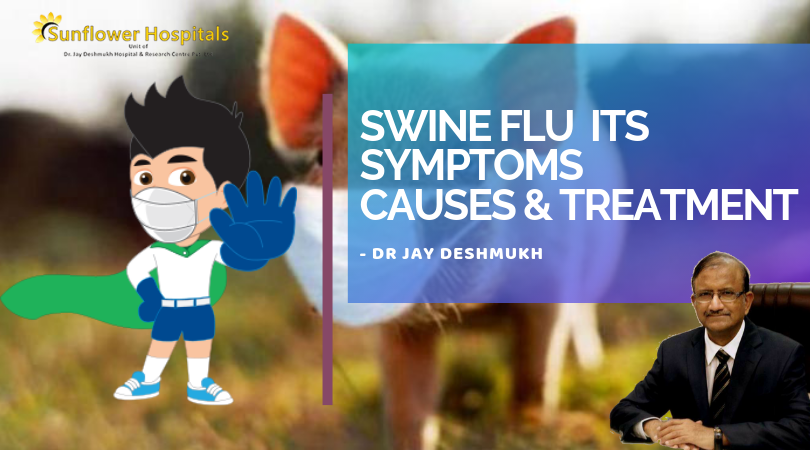Swine Flu Symptoms | Sunflower Hospital Nagpur | Dr Jay Deshmukh:- Swine flu continues to remind us about its presence as many people still fall prey to this disease. This is a viral disease and in its very initial phase may mimic a disorder akin to the common cold. This disease derives its name from swine which means a pig. The disease initially spread from pigs to humans. But now a human to human spread is most common.
Why is swine flu dangerous?
- The simple common cold virus is due to a virus that is self-limiting. Many times a common cold like a disease does not even require treatment. Swine flu, however, can spread very rapidly amongst the population and has the ability to cause serious symptoms and even death in certain individuals.
What are the initial symptoms?
- Swine Flu Symptoms | Sunflower Hospital Nagpur | Dr Jay Deshmukh:- Fever, headache, body ache, sore throat, running nose, red eyes and vomiting are the earliest symptoms. Unlike in common cold, these symptoms may persist for more than a week. Unlike the common cold infection, many patients with swine flu have loose stools and vomiting. These H1N1 symptoms develop one to three days after exposure to the virus.
When to see a doctor?
- Besides the above symptoms, if you have flu symptoms and are pregnant, or have a chronic disease such as asthma, emphysema, diabetes or a heart condition you must see your doctor. This is because the risk of complications is high.
What causes this viral infection?
- Swine Flu Symptoms | Sunflower Hospital Nagpur | Dr Jay Deshmukh:- Influenza viruses infect the cell lining your nose, throat and lungs. The virus enters your body when you inhale contaminated droplets or transfer the live virus from a contaminated surface to your eyes, nose or mouth. You do not catch swine flu by eating pork.
What are the risk factors?
- If you have travelled to an area where many people have been affected by the swine flu virus and particularly if you spend time in large crowds. The health care provider like the doctors, nurses, paramedics are always at risk.
What are the complications of swine flu disease?
- There could be worsening of chronic conditions such as heart disease and asthma. Pneumonia is a common complication of swine flu virus infection. Neurological signs and symptoms can occur. These could be disorientation, confusion and seizures. The most dreaded is, however, respiratory failure.
What is the treatment of swine flu?
- Most cases of H1N1 require only symptomatic treatment. If you have a chronic respiratory disease your doctor may ask you to take additional treatment to help relieve your symptoms. The antiviral drugs Oseltamivir and Zanamivir are sometimes prescribed within the first day or two of symptoms to reduce the severity of symptoms and to reduce complications. They are not effective after 4 days of illness. But flu viruses can develop resistance to these antiviral drugs.
Are antibiotics of any use?
- Generally, antibiotics have no role in viral infections. However secondary bacterial infections are common once a viral pneumonia sets in. Once an individual gets viral pneumonia a secondary bacterial infection is very common. This would need antibiotics.
What are the high-risk groups?
- Swine Flu Symptoms | Sunflower Hospital Nagpur | Dr Jay Deshmukh:- The high-risk groups are those who are in a hospital or Nursing home. Those younger than 2 years of age and above 60 years. Pregnancy or within 2 weeks of delivery, or those with past experience of abortion. Those who are very obese and with chronic medical conditions like asthma, diabetes, heart, liver, blood or kidney ailments. Those who have a suppressed immune system like HIV or on certain medications that suppress immunity.
What about vaccination against flu?
- Every flu season differs but the need for vaccination remains the same. The benefits of swine flu vaccination remain for a year. Annual vaccination is mandatory for high-risk groups. People with egg allergy should be careful.
What are the simple measures to prevent swine flu?
- Swine Flu Symptoms | Sunflower Hospital Nagpur | Dr Jay Deshmukh:- Cover your mouth or nose when you cough or sneeze. Wash your hands often with soap and water. Avoid crowded places and remain at arm’s length from a person suffering from swine flu. Drink plenty of water and nutritious food. Avoid handshakes and personal greetings. Do not spit in public and do not self medicate.
Swine flu continues to take many precious lives every year. Prompt identification and treatment is necessary. Yearly vaccination in high-risk groups is generally recommended. Self-medication needs to be avoided.
Author: Dr Jay Deshmukh
Dr Jay Deshmukh is Chief Physician and Director, Sunflower Hospital, Nagpur Honorary Physician to Honorable Governor of Maharashtra and PondicherryCentral. Dr Jay Deshmukh is an M.B.B.S., M.C.P.S., F.C.P.S., M.N.A.M.S., MD From Internal Medicine – Bombay and New Delhi.


